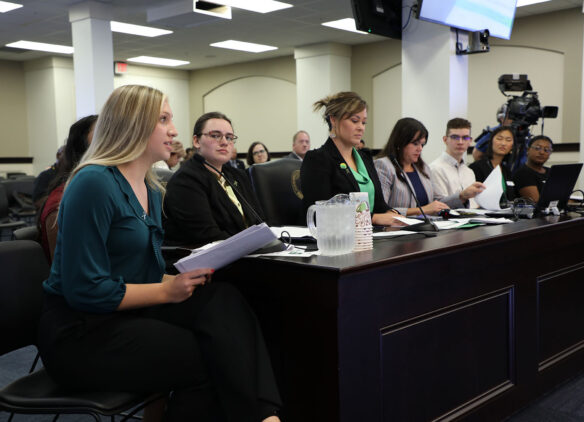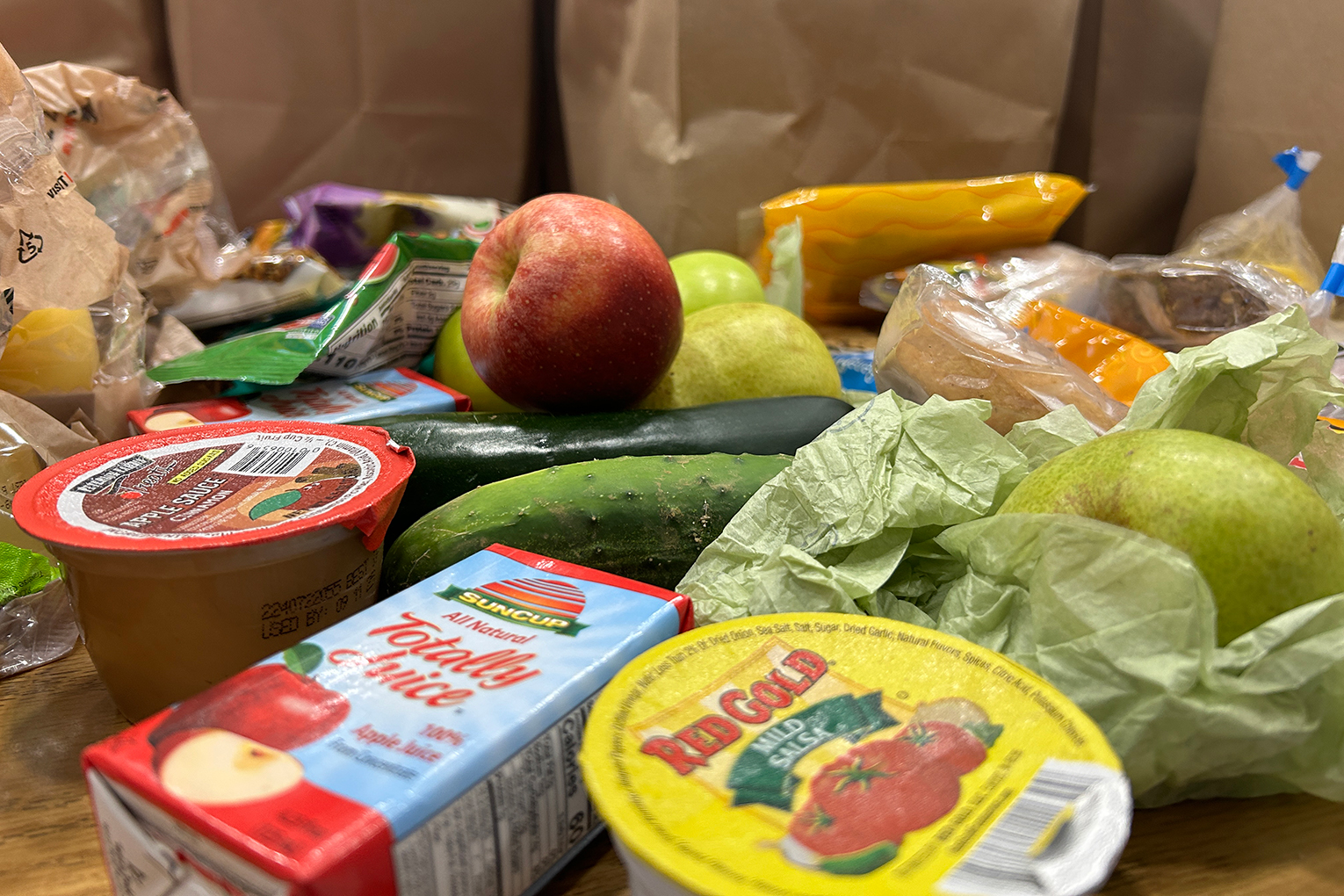
Charleigh Browning (left), a senior at Marion County High School, and other members of the Commissioner’s Student Advisory Council speak on student mental health at the Kentucky legislature’s Interim Joint Committee on Education meeting on Aug. 16. They were joined by Kentucky Lt. Gov. Jacqueline Coleman (middle), who cited data on student mental health. Photo from the office of Lt. Gov. Jacqueline Coleman, Aug. 16, 2022
Several current and former members of the Kentucky Department of Education’s (KDE’s) Commissioner’s Student Advisory Council (SAC) continued their advocacy efforts for student mental health during the Aug. 16 meeting of the Kentucky legislature’s Interim Joint Committee on Education in Frankfort.
The students joined Lt. Gov. Jacqueline Coleman and Deputy Chief of Staff Heather Dearing to discuss the Team Kentucky Student Mental Health Initiative and their policy recommendations following last fall’s Student Mental Health Action Summits. The recommendations are:
- Include and elevate student voice;
- Provide comprehensive suicide prevention;
- Allow excused mental health absences;
- Expand access to mental health services and treatment;
- Increase mental health awareness and education; and
- Increase and improve mental health professional development.
“We all know that the pandemic came with its own set of challenges and certainly created issues that none of us had to deal with before, but what it also did was it exacerbated old ones,” Coleman said.
Coleman said in 2018, the U.S. Centers for Disease Control and Prevention reported that while about 1 in 5 children had a mental disorder, only 20% of those children received care from a specialized mental healthcare provider.
She cited a Kentucky Youth Risk Behavior Survey done prior to the pandemic that showed 30% of high school students reported feeling sad or hopeless to the point of stopping some usual activities. The same survey showed 57% of students ages 12-17 with a major depressive episode did not receive mental healthcare.
During the pandemic, she said these trends did not improve. Nationally, between 2019 and 2020 there was a 21% increase in children diagnosed with behavioral or conduct problems.
The Kentucky Student Voice Team conducted its Coping with COVID Student Survey in May 2020 and found that students were feeling more unmotivated, stressed and anxious, but also more grateful and less worthless. Along with the increase in emotional distress, there was an increase in desire for mental health services.
To address these issues, Coleman partnered with the SAC, Kentucky’s regional education cooperatives, the Kentucky Department for Behavioral Health at the Cabinet for Health and Family Services and the cabinet’s Division of Family Resource Youth Service Centers to create the Student Mental Health Action Summits in the fall of 2021. The roundtable summits were created to hear from students directly and collect data that could be used to better address students’ mental health.
There were 10 events held across the Commonwealth – seven in-person in many education cooperative districts and three virtual – with nearly 300 students in attendance overall. At each event, student facilitators from the SAC framed the issue being discussed for the students who were in attendance and presented basic student mental health data before transitioning into breakout sessions. A local mental health clinician also was introduced at each summit to assist students if needed.
Students discussed questions surrounding different mental health challenges they and their friends have faced, their mental health needs at school, how their life in general affects their mental health and any recommendations they might have for policymakers. They also thanked legislators for the passage of House Bill 44 last session, sponsored by Rep. Bobby McCool, which mends KRS 159.035 to allow a local school district’s attendance policy to include provisions for a student’s mental or behavioral health status.
After analyzing the data gathered, the student advisors worked with Coleman and her office to finalize their recommendations for legislators.
Charleigh Browning, a senior at Marion County High School, praised her school for the actions it already is taking to improve students’ access to mental health services and treatment. She said the Family Resource and Youth Service Center at her school sets aside $3,500 in grant funds to help students who cannot afford insurance co-pays or payment for mental health services.
Spandana Pavuluri, a senior at duPont Manual High School (Jefferson County) emphasized the importance of student voice in policy recommendations.
“This doesn’t just mean having students at the table,” she said. “It means authentically including them in conversations that we’re having and really valuing their insights and thoughts and opinions.”
Following the Student Mental Health summits, participants were sent a follow-up survey about their experience. One of the main takeaways was that students felt they were not alone.
“I’m very proud of Kentucky,” said Coleman. “In many senses of this work, we are ahead of what we see going on in other states and we are flowing right with the national momentum.”




I raise 4 grand children.ental health is a huge factor in the success of young people. I have searched for help in this subject for months., even calling and emailed the governor’s office several times. This is a wonderful idea. Great accomplishment to those that recognized this situation
Big kudos to the KDE Student Advisory Council, Lt. Gov Coleman, and supporting staff for their intergenerational effort at lifting Kentucky students’ lived experience AND expert knowledge in this way.